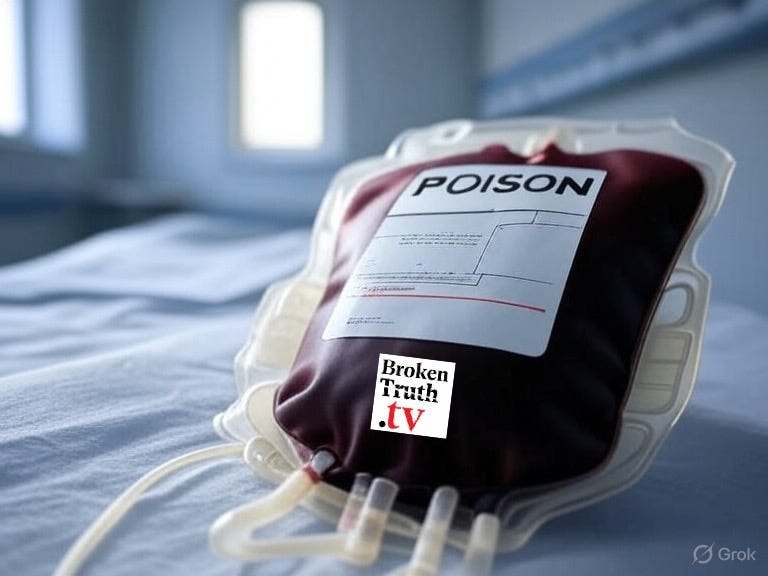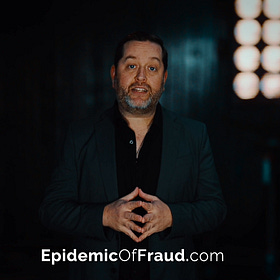In a today’s episode of Broken Truth, host John Davidson brings together a panel of experts to delve into the potential risks posed by mRNA COVID-19 vaccines to the global blood supply. Joined by attorney Warner Mendenhall, research scientist Kevin McKernan, and R. Clinton Ohlers, PhD, from Safeblood, the discussion uncovers alarming evidence of persistent spike protein production, residual DNA in vaccines, and the urgent need for screening and safe blood alternatives. Drawing from recent studies and personal testimonies, the panel highlights the frustrations of vaccine-injured individuals and calls for immediate action to protect public health.
The episode opens with Davidson setting the stage by playing clips that underscore the controversy. First, Robert F. Kennedy Jr. critiques the mRNA vaccine platform for its ineffectiveness against respiratory viruses and its potential to drive mutations (3:27). Kennedy argues that targeting a single antigen can paradoxically prolong pandemics through antigenic shift. Following this, nurse Michelle Utter shares her harrowing experience as a vaccine-injured individual, revealing she is still producing spike protein 1,629 days post-vaccination (4:38). Utter expresses deep frustration over the lack of medical acknowledgment and support, noting increased health issues, including new diagnoses requiring a "cancer protocol," and the denial of 98% of claims under the Countermeasures Injury Compensation Program (CICP).
Davidson and Mendenhall express empathy for Utter's plight, emphasizing the broader implications. Mendenhall points to data from Ed Dowd showing approximately 3 million additional disabled individuals in the U.S., likely linked to the vaccines (7:03). He stresses the need for a societal response, as individual lawsuits are overwhelmed by the scale of injuries.
Kevin McKernan's Groundbreaking Research on Vaccine Contaminants
Kevin McKernan, a prominent researcher whose work on mRNA vaccines has garnered widespread attention, provides a detailed summary of his findings. McKernan explains how his team discovered residual DNA in mRNA vaccines years ago, a result replicated by about ten labs worldwide (8:05). This DNA persistence raises questions about why spike protein is detected in patients up to 1,800 days post-vaccination—far longer than typical proteins like keratin (8:37).McKernan reviews key literature: The Yale study found spike protein at 709 days; Patterson's lab detected it at 245 days in long-haul patients (9:32). On the nucleic acid side, studies show DNA/RNA in heart tissue (30 days), lymph nodes (60 days), plasma (28 days), breast milk (5 days), and placenta (10:04). Further analysis of public RNA sequencing data from vaccinated individuals reveals plasmid DNA in blood, slipping through purification processes (10:57).
A critical unanswered question is where this DNA resides—floating in plasma, inside cells, or integrated into the genome (12:01). McKernan hypothesizes it may create a continual reservoir of spike protein, contaminating the blood supply. He warns that without screening, recipients risk inheriting vaccine remnants, echoing the HIV blood crisis where testing was initially resisted (13:55).
When asked if spike protein from vaccines differs from the virus, McKernan confirms it does—two protein mutations make differentiation possible via mass spectrometry, though it's costlier than standard ELISAs (15:04). He notes the protein persists in monocytes, requiring specific blood sorting for detection (16:18).
The Movie They Don't Want You to See: Epidemic of Fraud
Epidemic of Fraud is the award-winning documentary that explores the bizarre media, medical, and partisan political attacks levied against a class of ancient medications, told from the perspective of a former CNN journalist and Hollywood industry veteran.
Safeblood's Mission and the Push for Screening
R. Clinton Ohlers, representing Safeblood—a network connecting unvaccinated donors with recipients—highlights the complete absence of mRNA vaccine screening in blood banks. Despite evidence of vaccine components entering the bloodstream, banks in 2022 claimed otherwise (16:56). Ohlers advocates for on-site testing for informed consent and simple tracking of vaccinated vs. unvaccinated blood as a cost-free solution (17:33).
Ohlers shares anecdotes from nurses observing vaccinated blood coagulating faster, leading to rushed transfusions (19:56). He discusses apheresis (blood cleansing) as a potential treatment and praises McKernan's work on amyloidosis-linked clots (20:41). For emergencies, Ohlers suggests registries of unvaccinated universal donors (O-type blood) via apps like Uber (21:43).The panel addresses shedding concerns: McKernan cites anecdotal evidence and studies showing spike protein on exosomes in sweat and breath, potentially transmissible (25:46). However, he notes risks are likely exponentially lower than direct injection or transfusion (32:16). Ohlers adds that natural COVID infection produces far less persistent spike than vaccines (31:29).Legal and ethical issues surface, with Mendenhall referencing a lawsuit by nurse Michelle Stewart over a 5,000% spike in miscarriages at her hospital post-vaccine rollout (28:07). Ohlers notes increased restrictions on autologous (self-donated) and directed donations in states like Washington and Oregon, forcing patients to travel (37:46). The group suspects coordinated efforts by blood providers to suppress alternatives, possibly to protect their business model (41:29).
Pathways Forward: Testing, Litigation, and Policy Change
The experts propose solutions: Rapid spike protein and nucleic acid screening (13:42), legislation in 11 states to preserve donation rights (39:12), and litigation modeled on HIV cases (57:54). McKernan offers PCR primers to differentiate vaccine brands (48:02) and notes not all vaccinated blood may be contaminated—bad lots account for 78% of adverse events (51:22).
In a breaking development, Ohlers reveals a letter to Robert F. Kennedy Jr. prioritizing blood supply safety, now third on a health freedom agenda (54:18). Collaborations with figures like Dr. James Thorpe aim to document transfusion injuries for case series (55:37).
The episode closes on a hopeful note, with McKernan emphasizing decentralized platforms for truth-sharing and a potential favorable administration (1:06:05). As Mendenhall urges, "They deserve a rapid response at a national level" (1:05:59).
For more details, watch the full video above. Visit Safeblood for donor resources, and follow Kevin McKernan's Substack for updates on his research. Broken Truth continues to expose these critical issues—stay tuned.












